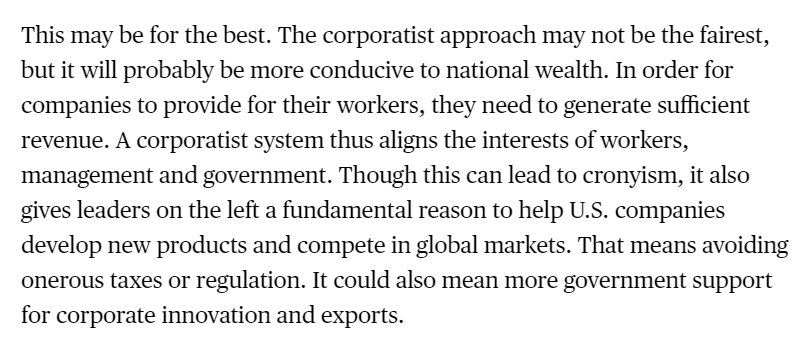
Today's @bopinion post is about a choice facing the American left: Whether to pursue social democracy or corporatism as the basic driver of equality.
bloomberg.com/opinion/articl…
bloomberg.com/opinion/articl…
Loosely speaking, "social democracy" is when you redistribute wealth via government, and "corporatism" is when you have the government force companies to take better care of their workers. 

The biggest downside of corporatism is that since it bases welfare on work, it's easy for people to fall through the cracks. Those cracks then have to be patched up, with things like SSDI, child care tax credits, Medicare, etc. 

But social democracy might simply be politically impossible. It has proven VERY hard to get Americans to vote for a Europe-style welfare state.
Corporatism might be a viable alternative.
Corporatism might be a viable alternative.

Enthusiasm for corporatist welfare policies on the left seems to be rising. These include:
* higher minimum wage
* co-determination
* penalizing companies for paying low wages
* reform of the financial system to encourage real business investment
* higher minimum wage
* co-determination
* penalizing companies for paying low wages
* reform of the financial system to encourage real business investment

Meanwhile, though universal health care is still probably the left's #1 policy goal, the ultimate welfare state idea - Universal Basic Income - appears to have lost the battle of ideas within the left. At least for now.
Fortunately, corporatism also has a pretty big silver lining for those who care about economic growth. It gives the government an incentive to help businesses innovate, export, and expand, and makes high taxes less attractive as a policy tool. 

"Corporatism" is an ugly-sounding name, and we probably need a better one. But the basic idea of using companies as society's main vehicle for social equality is not nearly as far-fetched as it might sound.
(end)
(end)

Ultimately, I think we may just have to call corporatism "progressivism". People will confuse it with social progressivism, but in fact the two probably go together better than they did in the past, so it's OK.
• • •
Missing some Tweet in this thread? You can try to
force a refresh








